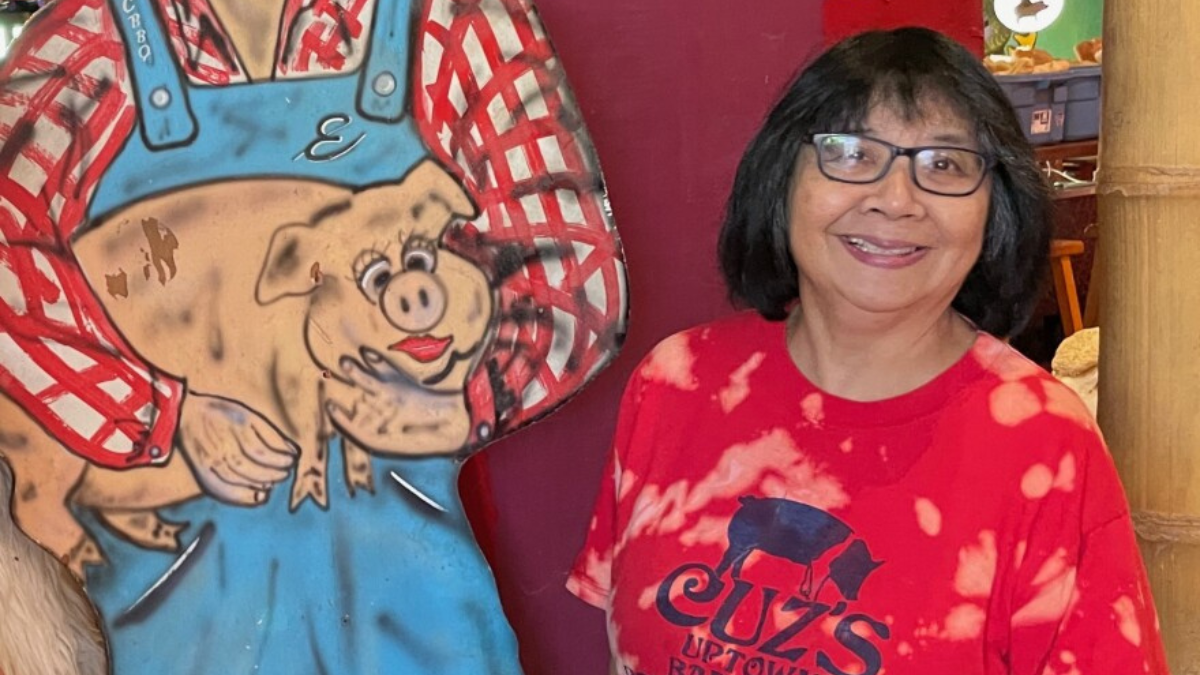This week, we visit with Jerry Machen of Kingsport, Tennessee. When he first started making art from old carpets, his wife Linda wasn’t impressed.
We also meet the devoted family and friends of Cuz’s Uptown Barbeque, who rallied behind the acclaimed Appalachian restaurant during a hard time.
And, it used to be that every grocery store had a trained butcher behind the counter. But that’s not the case so much today. So the owner of a Charleston abattre had an idea.
You’ll hear these stories and more this week, Inside Appalachia.
In This Episode:
- Buzz Foods To Train New Generation Of Butchers
- A Carpet Craftsman Creates Carpet Art
- Passover Observed During The Civil War
- A Community Rallies Around Cuz’s Barbecue
Buzz Foods To Train New Generation Of Butchers
The pandemic has shown how fragile our food supply chain can be. Distribution bottlenecks and breakdowns at processing plants have meant some products went missing from grocery store shelves.
That’s why Buzz Food Service in Charleston set out to build a new model for locally raised meat. But it needed butchers to make that work — but butchers can be scarce. So Buzz came up with an old-fashioned solution: an apprenticeship program.
Folkways Reporter Zack Harold has the story.
A Carpet Craftsman Creates Carpet Art
Lots of families live with furniture, silverware, and rugs, but we sometimes take them for granted. We seldom think about who makes these items — or where to turn when they need repaired.
One man in Kingsport, Tennessee, has been building and repairing carpets and rugs for more than 50 years. For Jerry Machen, Sr., the business not only provides him with a livelihood — but also an opportunity for expression and discovery.
Folkways Reporter Nicole Musgrave has the story.
Passover Observed During The Civil War
In 1862 during the Civil War, 20 Jewish Union soldiers came together in southern West Virginia for a Passover feast known as a seder. This year, a group in Beckley, West Virginia, recognized that event.
WVPB Reporter Shepherd Snyder spoke with Joseph Golden of Beckley’s Temple Beth El congregation and Drew Gruber of Civil War Trails about this event’s historical significance.
A Community Rallies Around Cuz’s Barbecue
People love to argue over which barbecue sauce is most authentic—vinegar, tomato or mustard. But Cuz’s Uptown Barbeque in Tazewell County, Virginia, is distinguished by something entirely different. For one thing, its food is inspired by Asian cuisine and local mountain specialities. You can find things on its menu like Morel mushrooms, cheesy egg rolls, and country ham caprese.
Folkways Reporter Connie Bailey Kitts and her family stopped in at Cuz’s for dinner and brought us us this story.
——
Our theme music is by Matt Jackfert. Other music this week was provided by Andrea Tomasi, The Steel Drivers, Erik Vincent and Mary Hott.
Bill Lynch is our producer. Our executive producer is Eric Douglas. Kelley Libby is our editor. Our audio mixer is Patrick Stephens. Zander Aloi also helped produce this episode.
You can send us an email at InsideAppalachia@wvpublic.org.
You can find us on Instagram and Twitter @InAppalachia and on Facebook here.
And you can sign up for our Inside Appalachia Newsletter here!
Inside Appalachia is a production of West Virginia Public Broadcasting.
